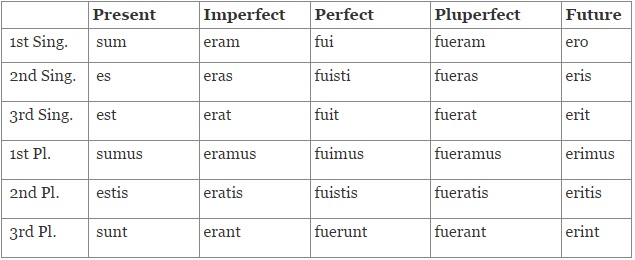There are a few verbs in Latin that do not follow the normal rules for verbs. They aren't part of any conjugation, they don't have normal-looking infinitives, and sometimes the different persons/tenses/voices of the verbs change in weird-looking ways. The biggest and most important example of an irregular verb is the verb "to be." Here are the principal parts of that verb:
sum, esse, fuī, futurus
Notice that the parts of this verb don't really look anything like each other, except a minor resemblance between "fui" and "futurus." Also, look at the second principal part, the infinitive. It doesn't have a normal infinitive ending, does it? Nothing about this is normal. You'll just have to live with that. Check out the present-tense versions of "be":
sum - I am
es - you are
est - he/she/it is
sumus - we are
estis - y'all are
sunt - they are
It doesn't just follow the normal format of "take the present stem and stick the correct ending on the end," does it? The beginning of the word changes; sometimes it's "su," sometimes "e," and sometimes "es," with no real pattern to it. This is something you'll just have to live with. Learn the forms of the verb "be," memorize them, put them on your iPod when you go to sleep, recite them to your dog, leave yourself voicemail messages with them on repeat, take them on a nice date and tell them you respect them... JUST KNOW THEM. Here they are, in all their glory:
sum, esse, fuī, futurus
Notice that the parts of this verb don't really look anything like each other, except a minor resemblance between "fui" and "futurus." Also, look at the second principal part, the infinitive. It doesn't have a normal infinitive ending, does it? Nothing about this is normal. You'll just have to live with that. Check out the present-tense versions of "be":
sum - I am
es - you are
est - he/she/it is
sumus - we are
estis - y'all are
sunt - they are
It doesn't just follow the normal format of "take the present stem and stick the correct ending on the end," does it? The beginning of the word changes; sometimes it's "su," sometimes "e," and sometimes "es," with no real pattern to it. This is something you'll just have to live with. Learn the forms of the verb "be," memorize them, put them on your iPod when you go to sleep, recite them to your dog, leave yourself voicemail messages with them on repeat, take them on a nice date and tell them you respect them... JUST KNOW THEM. Here they are, in all their glory:
INDICATIVE VERB "BE"
SUBJUNCTIVE VERB "BE"
OTHER IRREGULAR VERBS
There are other verbs that behave irregularly in Latin besides just "be." Only two of the following actually belong to a conjugation - "eō, īre, īī, ītum" which means "to go" belongs to the fourth conjugation, and "fīō, fierī, factus sum" belongs to the second conjugation. The rest don't have conjugations. All of them behave strangely and change their spelling in odd ways in certain grammatical situations. Here's a list of Latin's irregular verbs.
sum, esse, fuī to be
volō, velle, voluī to wish, want
ferō, ferre, tulī, lātum to bear
possum, posse, potuī to be able
nōlō, nōlle, nōluī to be unwilling
fīō, fierī, factus sum to become, be made
eō, īre, īī, ītum to go
mālō, mālle, māluī to prefer
ONE LAST THING:
There are some compound verbs that are basically the same thing as these, just with a prefix added on. For example, you know that "sum" is the irregular verb that means "I am," but when you add the prefix "ad" to it, it becomes "adsum," which just means "I am here/I am present." Conversely, "absum" means "I am not here/I am absent." There are a lot of different variations of prefixes, but if you recognize the root word beneath them, they're easy to remember and deal with.
sum, esse, fuī to be
volō, velle, voluī to wish, want
ferō, ferre, tulī, lātum to bear
possum, posse, potuī to be able
nōlō, nōlle, nōluī to be unwilling
fīō, fierī, factus sum to become, be made
eō, īre, īī, ītum to go
mālō, mālle, māluī to prefer
ONE LAST THING:
There are some compound verbs that are basically the same thing as these, just with a prefix added on. For example, you know that "sum" is the irregular verb that means "I am," but when you add the prefix "ad" to it, it becomes "adsum," which just means "I am here/I am present." Conversely, "absum" means "I am not here/I am absent." There are a lot of different variations of prefixes, but if you recognize the root word beneath them, they're easy to remember and deal with.


